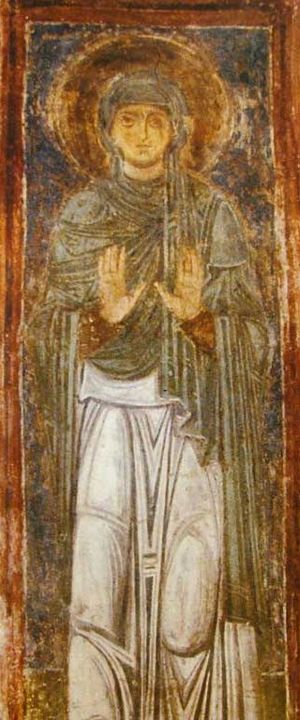Macrina the Younger facts for kids
Quick facts for kids SaintMacrina the Younger |
|
|---|---|
 |
|
| Born | c. 327 Caesarea, Cappadocia (modern-day Kayseri, Turkey) |
| Died | 19 July 379 Pontus (modern-day Anatolia, Turkey) |
| Venerated in | Eastern Orthodox Church Oriental Orthodoxy Roman Catholic Church Anglican Communion Lutheranism |
| Feast | 19 July 14 June (with Basil the Great, Gregory of Nyssa and Gregory Nazianzus; Lutheranism) |
Macrina the Younger (born around 327, died July 19, 379) was an important woman in the early Christian Church. She is honored as a saint in several Christian traditions, including the Roman Catholic and Eastern Orthodox Churches. Her younger brother, Gregory of Nyssa, wrote a book about her called Life of Macrina. In this book, he shared how holy and devoted she was throughout her life.
Macrina lived a very simple and humble life. She spent her time praying and helping to teach her younger brother, Peter, about spiritual things. Gregory of Nyssa said that Macrina chose to study the Bible and other holy writings very carefully.
Contents
Macrina's Family and Early Life
Macrina was born in a place called Caesarea, in Cappadocia. Her parents were Basil the Elder and Emmelia of Caesarea. Her grandmother was also named Macrina, known as Macrina the Elder. Macrina had nine brothers and sisters. Two of her brothers, Basil the Great and Gregory of Nyssa, became very famous Christian leaders. Another brother was Peter of Sebaste.
When Macrina was young, her father arranged for her to marry someone. However, her fiancé died before they could get married. After this, Macrina decided not to marry anyone else. She believed that Christ was her eternal partner. Instead, she chose to dedicate her life to her faith and became a nun.
A Life of Devotion and Influence
Macrina had a big impact on her brothers and her mother. She lived a very disciplined and spiritual life, which is sometimes called an ascetic life. This means she focused on spiritual growth by living simply and avoiding worldly pleasures.
Her brother Gregory of Nyssa wrote about how holy Macrina was. She lived a humble life, spending much time in prayer. She also helped educate her younger brother, Peter, in spiritual matters. Gregory said that Macrina chose to focus on studying the Bible and other sacred texts instead of traditional education.
Macrina and her mother later moved to one of their country homes. There, they started a special community for women who wanted to live a religious life. This community included both wealthy and non-wealthy women. Everyone in the community, including servants, had the same rights and duties. When her brother Naucratius died, it was a sad time for her mother. Macrina then took on a more important role in managing their home and community.
Later Life and Legacy
In 379, Macrina passed away at her family's estate in Pontus. With the help of her younger brother Peter, she had turned this estate into a monastery and convent. Even as she was dying, Macrina continued to show her devotion. She refused to lie on a comfortable bed and chose to rest on the ground instead.
After her death, Gregory of Nyssa wrote a book called "Dialogue on the Soul and Resurrection." In this book, he described a conversation he had with Macrina just before she died. This book was written in a style similar to the ancient Greek philosopher Plato. Macrina's feast day, which celebrates her life, is July 19.
Macrina is important because she set an example for how a holy Christian woman could live in the early Church. She also influenced her brother Gregory's writings and his beliefs about living a pure life dedicated to God.
Remembering Macrina
Some Christian thinkers, known as Universalists, believe that Macrina thought all people and even demons would eventually be purified and come to believe in Christ. They find clues for this idea in Gregory's "Dialogue on the Soul and Resurrection."
Macrina is also remembered in the Church of England. She is celebrated with a special day, called a Lesser Festival, on July 19, along with her brother Gregory of Nyssa.
Works About Macrina
- Gregory of Nyssa, Life of Macrina
- Gregory of Nyssa, Dialogue on the Soul and Resurrection
See also
 In Spanish: Macrina la Joven para niños
In Spanish: Macrina la Joven para niños
 | May Edward Chinn |
 | Rebecca Cole |
 | Alexa Canady |
 | Dorothy Lavinia Brown |

